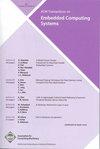基于图的边缘计算节能个性化联邦搜索
IF 2.6
3区 计算机科学
Q2 COMPUTER SCIENCE, HARDWARE & ARCHITECTURE
引用次数: 0
摘要
联邦学习(FL)是一种在边缘设备上进行隐私保护机器学习的流行方法。然而,边缘设备的异构性,包括系统架构、数据和协同运行应用程序的差异,会显著影响FL的能源效率。为了解决这些问题,我们提出了一个节能的个性化联邦搜索框架。这个框架有三个关键组成部分。首先,我们寻找推理效率高的部分模型,以减少训练能量消耗和每轮中掉队者的出现。其次,我们构建了轻量级的搜索控制器来控制模型采样和响应运行时的变化,减轻了由共同运行的应用程序引起的新的掉队问题。最后,设计了一种基于图聚合的自适应搜索更新策略,以提高个性化训练的收敛性。我们的框架通过降低每轮的训练开销和加快训练收敛速度来减少训练过程的能量消耗。实验结果表明,该方法的准确率高达5.02%,能效提高3.45倍。本文章由计算机程序翻译,如有差异,请以英文原文为准。
Energy-efficient Personalized Federated Search with Graph for Edge Computing
Federated Learning (FL) is a popular method for privacy-preserving machine learning on edge devices. However, the heterogeneity of edge devices, including differences in system architecture, data, and co-running applications, can significantly impact the energy efficiency of FL. To address these issues, we propose an energy-efficient personalized federated search framework. This framework has three key components. Firstly, we search for partial models with high inference efficiency to reduce training energy consumption and the occurrence of stragglers in each round. Secondly, we build lightweight search controllers that control the model sampling and respond to runtime variances, mitigating new straggler issues caused by co-running applications. Finally, we design an adaptive search update strategy based on graph aggregation to improve personalized training convergence. Our framework reduces the energy consumption of the training process by lowering the training overhead of each round and speeding up the training convergence rate. Experimental results show that our approach achieves up to 5.02% accuracy and 3.45× energy efficiency improvements.
求助全文
通过发布文献求助,成功后即可免费获取论文全文。
去求助
来源期刊

ACM Transactions on Embedded Computing Systems
工程技术-计算机:软件工程
CiteScore
3.70
自引率
0.00%
发文量
138
审稿时长
6 months
期刊介绍:
The design of embedded computing systems, both the software and hardware, increasingly relies on sophisticated algorithms, analytical models, and methodologies. ACM Transactions on Embedded Computing Systems (TECS) aims to present the leading work relating to the analysis, design, behavior, and experience with embedded computing systems.
 求助内容:
求助内容: 应助结果提醒方式:
应助结果提醒方式:


